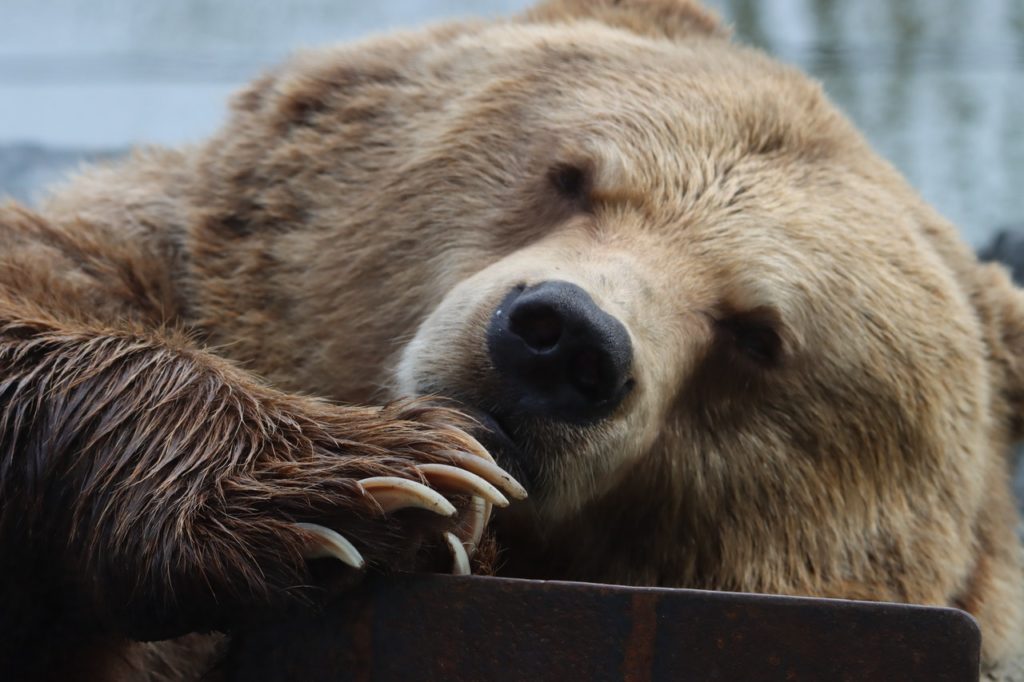I learned this today. Hibernation is not the same as sleeping. Animals sometimes have to come out of hibernation to be able to sleep.
Hibernation is basically an energy-saving technique. During the winter, the temperature obviously drops, which means that endothermic animals (animals that generate their own heat internally) need more energy to keep themselves warm. At the same time, the cold weather and winter conditions mean that their food sources are usually scarce. Hibernation is an evolved way of getting around that problem.
Animals eat as much food as they can through the summer and autumn months. They need to store as much energy as fat in their bodies as they can. Then, when the temperature drops, they start to hibernate.
In a state of hibernation, the body temperature drops, breathing slows down, the heart rate slows down, and the metabolic rate slows down. In some animals, these changes can be extreme. The Arctic ground squirrel’s body temperature can drop to -2.9℃ when hibernating. Some bats’ heartbeats fall from 400 beats a minute to 11 and they only breathe once an hour.
However, these animals are not asleep. Rather, they are in a state of torpor. Their low metabolic rate, heartbeat, and body temperature help them survive the winter, but they appear to build up a sleep debt. Occasionally, hibernating animals have to rouse themselves, raise their body temperature, and sleep.
Bears are famous for being hibernating animals, but their body temperature rarely drops by more than 5℃. This is hardly anything when you compare it with other hibernating animals.
Bears are amazing in the way that they hibernate. Before they hibernate, they eat as much as they can, loading up their fat stores. Then they enter their den and begin hibernating. Through the whole time that they are hibernating they don’t urinate, eat, drink or defecate. They are able to recycle their own urine. They live off the fat in their bodies and they get water when they metabolize it. Urea is produced when they metabolize the fat and this would be fatal if not expelled from the body, but the bears are able to break it down, releasing nitrogen. This nitrogen is, in turn, used to build protein which lets them maintain muscle mass and organ tissue. Bears can lose up to 40% of their body mass while they are hibernating.
Humans obviously don’t hibernate, but there are several things that scientists are trying to learn from hibernating animals. Each one of these things could have a big impact on us.
When bears hibernate, their cholesterol levels are twice as high as the average human, yet their arteries don’t harden, and they don’t get gallstones. The bear’s liver secretes a substance that prevents this. if we could learn how to do this, we could cut the risks of high cholesterol.
Hibernating bears don’t lose bone mass. Mammals constantly lose bone matter, and it is replaced. The calcium from the bones goes into the bloodstream and is refreshed with new calcium. When hibernating, there is no source of calcium, so bears should get osteoporosis, but they don’t. They are able to slow down the process and keep their bones strong. If we could learn this, we could help people in hospitals or astronauts on long space voyages.
Arctic ground squirrels (the ones whose body temperature drops below zero), could help us understand Alzheimer’s disease. Alzheimer’s is caused by the build-up of a protein called tau in the brain. When these squirrels hibernate, the neurons in their brains shrink and connections shrivel. The tau protein builds up in their brains. Yet, when they wake up, they are able to clean out all of this protein and their brains return to normal. If we could learn how to do this, we could clean the protein out of the brains of people with Alzheimer’s.
So, when animals hibernate, they are not sleeping, but have slowed their body functions down to the bare minimum necessary to stay alive. Their body temperature drops, their heart rate slows, their breathing slows, and their metabolism slows. If we could learn how animals do all of the things that they do when hibernating, we could make some serious medical breakthroughs.
Sources
https://www.nps.gov/yell/learn/nature/denning.htm
https://www.pbs.org/wgbh/nova/article/secrets-of-bear-hibernation-could-help-us-get-to-mars/
https://www.riken.jp/en/news_pubs/research_news/rr/20201225_3/index.html
https://www.science.org.au/curious/hibernation
https://en.wikipedia.org/wiki/Hibernation

